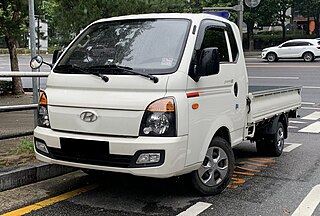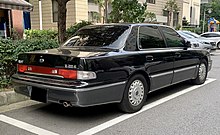
The Peugeot 504 is a mid-size, front-engine, rear-wheel-drive automobile manufactured and marketed by Peugeot from 1968 to 1983 over a single generation, primarily in four-door sedan and wagon configurations – but also as twin two-door coupé and cabriolet configurations as well as pickup truck variants.

The Mitsubishi Diamante is an automobile that was manufactured by Mitsubishi Motors from 1990 to 2005.

The Mazda Sentia is a mid-size rear wheel drive luxury car that was sold by Mazda in Japan from 1991 to 1999 over two generations. It replaced the Mazda Luce nameplate on the Mazda H platform, and continued the tradition of being Mazda's largest flagship sedan, which had been in production since the late 1960s.

The Honda Legend is a series of V6-engined executive cars that was produced by Honda between 1985 and 2021, and served as its flagship vehicle. The Legend has also been sold under the Acura Legend, RL and RLX nameplates — the successive flagship vehicles of Honda's luxury Acura division in North America from 1986 until 2020.

The Mitsubishi Lancer is an automobile that was produced by the Japanese manufacturer Mitsubishi Motors from 1973 until 2024.

The Nissan Pulsar is a line of automobiles produced by the Japanese automaker Nissan from 1978 until 2000, when it was replaced by the Nissan Bluebird Sylphy in the Japanese market.

The Hyundai Elantra, also known as the Hyundai Avante, is a compact car produced by the South Korean manufacturer Hyundai since 1990. The Elantra was initially marketed as the Lantra in Australia and some European markets. In Australia, this was due to the similarly named Mitsubishi Magna Elante model; similarly, in other markets, the name Avante is not used due to its similarity with Audi's "Avant" designation, which is used for their line-up of station wagons. The name was standardized as "Elantra" worldwide in 2001.

The Hyundai Sonata is a mid-size car that has been manufactured by Hyundai since 1985. The first generation Sonata, which was introduced in 1985, was a facelifted version of the Hyundai Stellar with an engine upgrade, and was withdrawn from the market in two years due to poor customer reaction. While the nameplate was originally only sold in South Korea, the second generation of 1988 was widely exported.

The Toyota Mark II is a compact, later mid-size sedan manufactured and marketed in Japan by Toyota between 1968 and 2004. Prior to 1972, the model was marketed as the Toyota Corona Mark II. In most export markets, Toyota marketed the vehicle as the Toyota Cressida between 1976 and 1992 across four generations. Toyota replaced the rear-wheel-drive Cressida in North America with the front-wheel-drive Avalon. Every Mark II and Cressida was manufactured at the Motomachi plant at Toyota, Aichi, Japan from September 1968 to October 1993, and later at Toyota Motor Kyushu's Miyata plant from December 1992 to October 2000, with some models also assembled in Jakarta, Indonesia and Parañaque, Philippines as the Cressida.

The Mitsubishi Chariot is an automobile manufactured and marketed by Mitsubishi from 1983 to 2003. It is a small multi-purpose vehicle (MPV). Based on the SSW concept car first exhibited at the 23rd Tokyo Motor Show in 1979, the MPV derives its nameplate from chariots used by the ancient Greek and Roman empires.

The Hyundai Grandeur is an executive sedan manufactured and marketed by the South Korean manufacturer Hyundai since 1986, over seven generations.

The Hyundai Porter, also known as the Hyundai H-100, is a cabover Pickup truck produced by the South Korean manufacturer Hyundai since 1977.

The Mitsubishi Tredia is a subcompact sedan built by Mitsubishi Motors from 1982 to 1990. Its name is supposedly derived from Mitsubishi's "Three Diamonds" logo. Alongside the Cordia and Starion, it was one of the first cars imported and sold to America by the company without the involvement of its then partner, the Chrysler Corporation. In Japan, it was sold at a specific retail chain called Car Plaza.

The Mitsubishi Delica is a range of vans and pickup trucks designed and built by the Japanese automaker Mitsubishi Motors since 1968. It was originally based on a cabover van and pickup truck introduced the previous year, also called the Delica, its name a contraction of the English language phrase Delivery car. This pickup truck, and a commercial van derived from it has received many names in export markets, being sold as the L300 in Europe, Jamaica and New Zealand, Express and Starwagon in Australia, and plain Mitsubishi Van and Wagon in the United States. The passenger car versions were known as Delica Star Wagon from 1979 until the 1994 introduction of the Delica Space Gear, which became simply Space Gear in Europe at least. The most recent version is called the Delica D:5. With the exception of the first, versions of all generations are still being sold in various international markets.

The Holden Commodore (VZ) is a full-size car that was produced by Holden from 2004 to 2006 as a sedan and to 2007 as a wagon and Ute sold alongside the new VE series. It was the fourth and final iteration of the third generation of the Commodore and the last to spawn a coupé variant. Its range continued to include the luxury variants, Holden Berlina (VZ) and Holden Calais (VZ).

The Mitsubishi Debonair is a four-door executive sedan introduced by Mitsubishi Motors in 1964 to serve as their flagship passenger vehicle in the Japanese market. The word "debonair" means gentle, courteous, suave, lighthearted, or nonchalant. Three distinct generations were available during its 35-year production run until it was discontinued in 1999. The first and second generation models were built mainly for senior level executives of the Mitsubishi Group and affiliated companies, essentially a Mitsubishi senior executive company car made by the motor vehicle division of Mitsubishi.

The Mitsubishi Dignity is a full-size luxury car originally manufactured by Mitsubishi Motors from late 1999 to 2001 as the flagship of the company's domestic range, alongside the shorter Proudia, and was reintroduced 2012 to Japanese buyers as a rebadged fifth-generation Nissan Cima. The Dignity was discontinued for the second time in 2016. In Japan, it was sold at a specific retail chain called Galant Shop.

The Mitsubishi Proudia is a luxury sedan manufactured by Mitsubishi Motors, positioned below the flagship Dignity limousine in the company's range. Its name is a portmanteau derived from the English word "proud" and "diamond". The first generation was produced from late 1999 to 2001, while the second generation was produced from 2012 to 2016.

The Hyundai Starex is a series of light commercial vehicles built by Hyundai. First-generation models were known in Europe as the Hyundai H-1, and in the Netherlands as the Hyundai H200. The cargo variant of the second-generation models was marketed as the Hyundai iLoad in Australia and the United Kingdom. The second-generation passenger variant was marketed as the Hyundai iMax in Australia and as the Hyundai i800 in the United Kingdom. In Europe, the cargo variant was marketed as the Hyundai H-1 Cargo, while the passenger variant was marketed as the Hyundai H-1 Travel. In the Netherlands, it is called the Hyundai H300. In Malaysia, the passenger variant of the H300 is only sold as a fleet vehicle, and the cargo variant is marketed as the Hyundai StarexRoyale in a Minivan configuration.

The Toyota Crown Majesta is a full-size luxury sedan from Toyota. It is an upmarket variant of the Crown and serves as Toyota's flagship model in various countries.





















